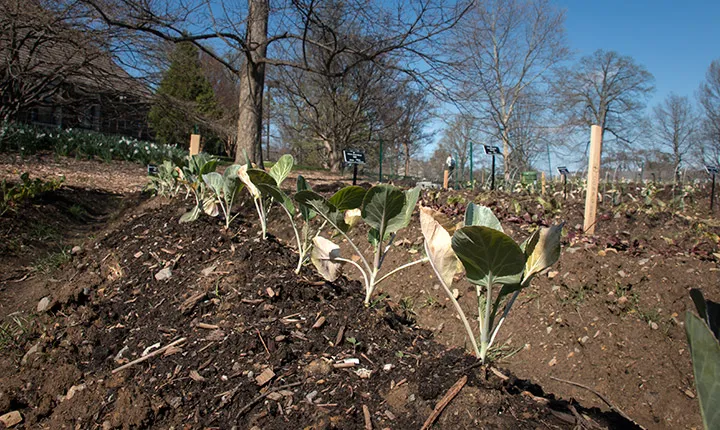Growing Awareness: New Course and Campus Garden Draw Attention to Food System

The student garden in mid-April. Located behind Sharples Dining Hall, the garden was intended to be a “pop-up” garden: a plot that is developed and then removed at the end of growing season. But because of high interest, the course will be offered again next fall and the garden will remain.
It’s one thing to learn about the biology of fruits and vegetables in a classroom, and another to actually grow your own.
That was the case this semester for 22 students in the Our Food course, who were tasked with developing and maintaining a small garden behind Sharples Dining Hall. A collaboration between the environmental studies and biology departments, the course is the latest Swarthmore proposal designed to give greater consideration to food issues on campus.
“The garden supports the course, and the course supports the garden,” says Visiting Assistant Professor of Biology and Environmental Studies Jennifer Pfluger, who teaches the course.
The course is the result of efforts between the environmental studies department and Office of Sustainability to establish a campus microgarden. Last summer, the two groups hosted a campus walkabout to determine locations for potential gardens. Following the walkabout, Pfluger—who has in the past been frustrated by the underutilization of most school gardens—proposed a food and agriculture seminar with an associated garden component.
The garden and course have provided students with the opportunity to experience the process of growing food. Additionally, the project is a visible educational tool for the public, as it draws attention to how we get the food we eat.
Students in the course pick a specific plant to focus on throughout the semester. Antonia Violante ’16, a psychology major from Troy, Mich., chose a variety of leaf broccoli called spigariello. Violante describes the hands-on experience that Our Food offers as insightful.
“From water to compost to genetic modifications, understanding the complexity of keeping a single plant healthy has helped me to appreciate the complexity of our entire food system,” she says.
The garden was intended to be a “pop-up” garden: a plot that is developed and then removed at the end of growing season. But because of high interest, the course will be offered again next fall and the garden will remain.
Bennett Thompson ’16, a biology major from North Liberty, Iowa, shares a similar experience in Pfluger’s course. He has spent his entire Swarthmore career working with food as part of the Good Food Project, a student organization that works to promote awareness about food as the intersection of sustainability, health, and social justice and maintains a large campus garden at the corner of Cedar Lane and Elm Avenue.
“I was ecstatic when Jennifer Pfluger and [Professor of English Literature] Betsy Bolton brought together the Our Food course,” says Thompson, who grew green cabbage and bunching onions throughout the semester. “It allows me to study for credit the very things I’ve had extracurricular interest in since day one at Swarthmore.”
He also believes that the course helps students like himself truly appreciate the food we eat.
“Having gardening as part of a course on food is so essential,” he says. “We not only learn about plants and pick up some lifelong skills, but we also gain appreciation for the labor, expertise, and struggles of those who grow our food.”



